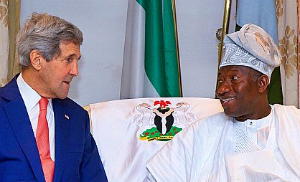Nigerian Baptists react to Kerry's visit ahead of election
As Nigeria prepares to vote in a presidential election, Nigerian Baptists share their thoughts about US Secretary of State John Kerry's visit to the African nation. By Brian Kaylor
With voters in Nigeria set to vote in a presidential election later this month, US Secretary of State John Kerry flew into the nation last week. His visit came amid violent attacks by the terrorist group Boko Haram, which has killed thousands of civilians and displaced more than a million others over the past six years.
 |
|
US Secretary of State John Kerry sits with Nigerian President Goodluck Jonathan in Lagos, Nigeria, on 25 Jan for meetings with him and his re-election challenger, retired Major-General Muhammadu Buhari. (Photo: U.S. State Department/Public Domain)
|
EthicsDaily.com reached out to three prominent Nigerian Baptists for their thoughts on Kerry's visit and current events in their nation.
Israel Olofinjana, a Nigerian who serves as the minister of Woolwich Central Baptist Church in southeast London and the director of the Centre for Missionary from the Majority World, praised Kerry's visit as "timely and needed."
'It has become apparent that the Nigerian government has failed to deal appropriately with the issue of Boko Haram and therefore Nigeria needs international help,' he said. 'The US secretary of state visit should be considered as one. However, I hope the relationship being developed will not be colonial or neocolonial.'
Timothy Olagbemiro, a top administrator at Bowden University (a private university affiliated with the Nigerian Baptist Convention) before his retirement in 2013, similarly noted Kerry's visit came at a "crucial time."
He added that the visit "is timely, although a belated one."
Samson Ayokunle, president of the Nigerian Baptist Convention, echoed the mix of praise and criticism for Kerry.
He called it a "face-saving visit" since it did not occur until after "several thousand … were already dead."
He added, however, that it is "never too late to bring something positive."
Ayokunle also criticised US officials for not doing more to help Nigeria militarily in the fight against Boko Haram.
He argued many of the political and sectarian problems in the country emerged from British colonial rule, and therefore urged US officials to avoid making similar mistakes.
Both Olofinjana and Olagbemiro noted the closeness of Kerry's visit to the upcoming Nigerian presidential election.
'Secretary Kerry's visit is a pointer that the US is watching all preparations with keen interest,' Olagbemiro said. 'His visit reminds Nigerians that the election must be keenly contested. During his visit, Kerry reiterated that in the interest of peace and fair play, the election must be conducted and not postponed.'
The presidential election, set for 14 February, offers a rematch of the contentious 2011 election.
Incumbent president Goodluck Jonathan seeks a second term against Muhammadu Buhari and 12 other candidates.
Jonathan defeated Buhari by a 59-32 percent margin in 2011, but post-election violence that led to the deaths of about 800 people marred the results.
Kerry, who met with both Jonathan and Buhari during the trip, urged a fair and peaceful election.
It is feared that post-election unrest could help Boko Haram make gains outside the northeastern part of Nigeria that it currently controls.
Regional and sectarian tensions could fuel anger at the election's results. Jonathan, a Christian from the south, has been criticized for corruption during his tenure.
Buhari, a Muslim from the north, previously ruled the country for two years in the early 1980s after leading a military coup that overthrew a democratically elected president.
Buhari, who was himself removed from office in a military coup, previously participated in a 1966 counter-coup that sparked massive unrest in the nation that led to genocide and a civil war.
Ayokunle noted the problem of corruption in his comments and the role Christians in Nigeria are attempting to play in combating corruption.
Governmental corruption in Nigeria and other nations is considered a contributing factor in the rise of violent religious groups like Boko Haram.
'I am also aware of the demon of corruption in this nation to which our government must do something urgently in order to bring back credibility to the nation,' Ayokunle told EthicsDaily.com. 'The Christian Association of Nigeria has embarked on a campaign of 'Be the Change You Want to See' so that Christians in all walks of life might live worthy lives that others would emulate.'
Last month, Ayokunle criticised the international community for ignoring the attacks by Boko Haram.
He noted that Christians are particularly targeted, but that the international community appears to treat Nigerians as "less human" than those killed elsewhere.
Ayokunle reiterated his criticism in his comments to EthicsDaily.com.
'Why did major world leaders converge in France to give France solidarity without many of them showing any concern for what is happening in Nigeria beyond just making comments?' he asked.
Olofinjana similarly urged greater international attention to the situation in Nigeria.
'This is a priority situation!' he said. 'The story about the havoc of Boko Haram has also got to be highly profiled in the media just like the crisis in Syria and Iraq and of recent in France are highly profiled.'
All three Baptists mentioned the role prayer plays in helping Nigerian Baptists in the midst of violence.
'Baptists in Nigeria continue to see the Lord's intervention in the ordeals that innocent Nigerians, Muslim and Christians alike undergo,' Olagbemiro said.
'Quite often, we pray for those afflicted with pains, death, loss of property, etc., and also pray for the perpetrators of these despicable acts of man's inhumanity to man! We pray often that the Lord may touch their hearts. This is the Way we were taught: Love those that hate and despitefully use us!'
This article first appeared on Ethics Daily.com, and is republished with permission. Brian Kaylor is a contributing editor for EthicsDaily.com. You can follow him on Twitter @BrianKaylor.
Baptist Times, 05/02/2015